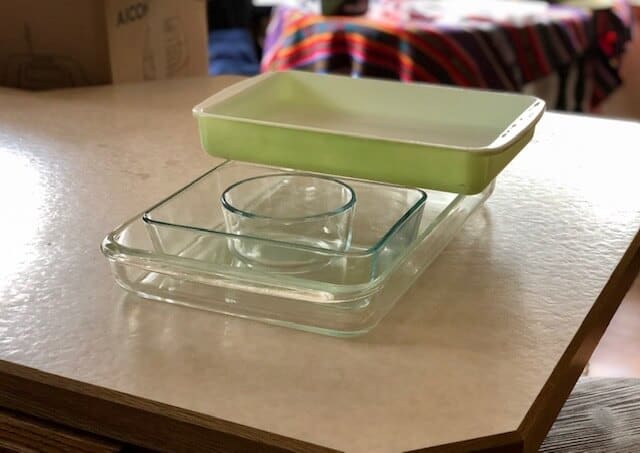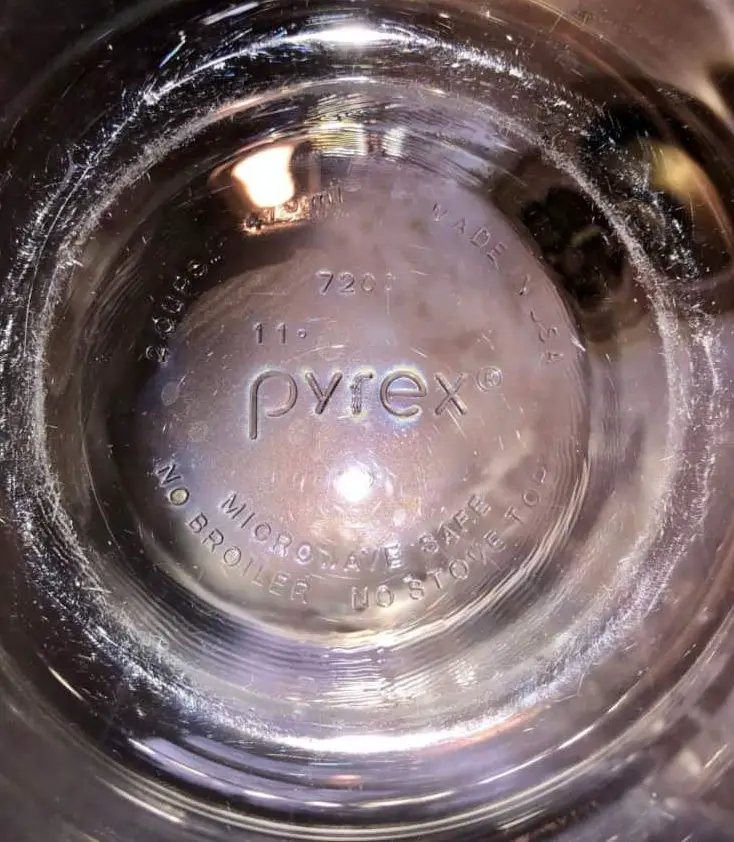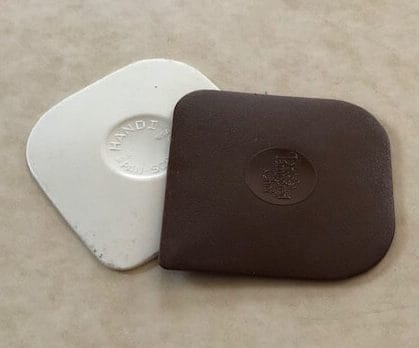
One of the most popular materials used in the kitchen is glass. If you’re planning to do some baking, then you’ve probably wondered if you can put glass or Pyrex in the oven.
Most glass bakeware is specifically made to be safe in the oven. However, not all glass dishes are meant to be put in the oven. To make sure your glass dish is oven-safe, you can check for the oven-safe symbol on the bottom of the dish, or you can check the manufacturer’s website.
Below, I’ve put together a breakdown of the most common types of glass dishes as well as ways to prevent them from cracking and breaking. Let’s get started!
Disclaimer: This post contains affiliate links. This means I may earn a commission should you choose to make a purchase using my link
Table of Contents
Can You Put Glass in the Oven?

Many types of glass dishes are oven-safe. Most dishes, especially new ones, will have a stamp on the bottom that states if they are oven-safe or microwave-safe.
If it doesn’t say this specifically, it might still say what you can’t do with it. Such as no broiler or no stovetop, like in the picture above.
But, if you have an older dish or just bought something from Goodwill, it may not say if it’s oven-safe or not. Don’t worry though, if you know the brand of your dish, it’s pretty easy to find that information online.
Next, let’s talk about the types of glass that are typically used for making glass bakeware, and then we’ll mention a few common brands that make oven-safe glass.
Types of Glass Used in Bakeware
1. Tempered Glass
You’ve probably heard of this type of glass when people talk about car windows. Surprise, it’s also used in a lot of bakeware.
This type of glass is specially made to increase strength and heat resistance making it a great option for bakeware.
It also has the added benefit of breaking into small chunks if it’s broken. These chunks are much less sharp and less likely to cut you during cleanup.
However, unlike other types of glass where taking a little chip out of it won’t ruin the dish, with tempered glass, if this happens, the whole dish may break into those tiny chunks. It’s kind of an all-or-nothing type of glass.
2. Borosilicate Glass
Borosilicate glass is what a lot of common brands of glass bakeware are made of, including Pyrex and International Cookware.
This type of glass is the most resistant to thermal shock, meaning it can have a huge change in temperature without breaking.
For example, for some types of glass, if you take it out of the oven and immediately put cold water on the dish, it will shatter. Obviously don’t try this for any type of glass, but it is more resistant to these types of temperature changes.
This type of glass is also very resistant to corrosion making it perfect for backyard experiments. No beaker, no problem, just use Pyrex.
3. Soda-Lime Silicate Glass
This is what most glass stuff is made of nowadays, from soda bottles to window panes to glass bakeware.
Soda-lime glass gained popularity because it can be reheated and reformed tons of times which makes recycling it and forming it into things super easy.
This type of glass is durable and can sustain very high temperatures. It’s also less susceptible to thermal shock than some other glasses.
4. Ceramic-Glass
Some people may consider ceramic to be a different category, but guess what, it’s still a type of glass.
Ceramics can be exposed to higher temperatures than other kinds of glass and it’s pretty much immune to thermal shock. But, they do take longer to heat up and therefore they take longer to cook things.
The most common brand of ceramic-glass bakeware is CorningWare. They claim you can take the dish out of the freezer and put it directly into a hot oven without it breaking. That’s pretty impressive.
Now that we’ve gone over the types of glass bakeware is usually made of, let’s look at some of the most common, and probably the best, brands of oven-safe glass bakeware.
Oven-Safe Bakeware Brands
1. Pyrex

Pyrex Oven-Safe Glass Bakeware (See on Amazon) *we receive commissions at no extra cost to you, thanks!
Pyrex and glassware have nearly become synonymous over the years because of their popularity.
Pyrex is usually made of tempered glass which gives it strength and heat resistance.
Even their small food storage containers are oven-safe which means your leftovers can be warmed right in the oven.
If you use plastic lids for your containers, just remember not to bake with the lids on the containers as they will melt in the high temperatures.
Pyrex is well known for its glass storage container and is a great option for food prepping or, if you’re like me, cooking a big meal and saving the leftovers.
One thing to keep in mind if you use Pyrex is that it’s important to check your bakeware regularly for any chips or scratches as this can compromise the integrity of the glass.
Baking with a dish that has damage raises the risk of the dish breaking when exposed to high temperatures. But, if you don’t have any significant chips or scratches, you should be good to go for quite some time.
2. CorningWare

CorningWare Oven-Safe Ceramic Bakeware (See on Amazon) *we receive commissions at no extra cost to you, thanks!
CorningWare is made from ceramic glass. Ceramic glass is usually heavier than other kinds of glass but is also more durable and resistant to thermal shock.
They are microwave, oven, refrigerator, freezer, and dishwasher safe. CorningWare also makes some casserole dishes that are stovetop, microwave oven, and broiler safe which isn’t normally the case with casserole dishes.
So, if you do a lot of your cooking with a microwave oven, then CorningWare is a great option just make sure it specifically says it’s microwave oven safe.
The lids that are included with the dishes are made out of different materials and are only meant to be used as a cover after your food has been cooked.
3. Anchor Hocking

Anchor Hocking Oven-Safe Glass Bakeware (See on Amazon) *we receive commissions at no extra cost to you, thanks!
Anchor Hocking uses tempered glass to make their glass bakeware. They are oven, microwave, dishwasher, and freezer safe.
Even though it’s both freezer and oven-safe, make sure you don’t take the dish out of the freezer and immediately put it in the oven or vice versa.
This is thermal shock at its finest and could cause your bakeware to break in a very glorious fashion.
Because Anchor Hocking dishes are made of tempered glass, also make sure you inspect your pieces for any cracks or damage before using them.
With tempered glass, the smallest crack can cause the whole piece to shatter if exposed to heat or cold. I know it sounds weird but it’s true.
As long as you check your dishes every once and a while, you should be good. These pieces also come with plastic lids to use when storing food but don’t leave the lids on while baking, they will melt.
Next up, we’ll briefly cover 3 key ways you can protect your glass bakeware.
How to Protect Your Glass Bakeware
1. Avoid Thermal Shock
This is probably the best thing you can do to prevent your bakeware from breaking.
Thermal shock occurs when there is a rapid change in the temperature of an object. Such as taking a dish straight from the freezer and putting it into a hot oven.
This shock can cause cracks, chips, and in some cases, complete breakage of your glass dish.
These things can also occur if you expose your glassware to a direct heat source such as a broiler or a stovetop.
To avoid thermal shock from happening, make sure your dish is around room temperature before placing it in the oven or into the fridge or sink.
When pulling a hot dish from the oven, make sure you don’t place your dish on a wet surface as the water can cause rapid cooling.
That’s pretty much all there is to thermal shock. Don’t go from one extreme to the other and you’ll be fine.
2. Clean Properly
Most glass bakeware is dishwasher safe, but sometimes a dishwasher isn’t enough for those tough stains.
When cleaning your glass bakeware, it’s important not to use abrasive cleaners. In other words, don’t use things that will cause scratches or damage to your glassware such as SOS pads or something similar.
The best way to get baked-on food out of bakeware is to soak the dish in hot soapy water for a couple of hours and then wash it normally.
An alternative to SOS pads is to get a plastic scraper. This just looks like a flat piece of plastic that is thinner on one side. It’s great for getting up tough grime while protecting your glassware from scratches.
Here’s an example of what they look like.

3. Check for Damage
This is important to do for all glass dishes but is especially important if it’s made from tempered glass.
Cracks or scratches in a glass dish can increase the risk of your dish breaking when exposed to extreme heat or cold.
An easy way to check your dishes is to examine them right before you put them away. This way your dish is sparkling clean and it’s easy to see cracks. If you do find any damage, don’t use that dish.
If your dish is damaged and it’s relatively new, you may be able to claim a warranty. This depends on the brand and the type of damage, but hey, it’s worth checking!
Related Questions
Can you put a drinking glass in the oven?
In general, you shouldn’t put a regular drinking glass in the oven. Drinking glasses are made with a different type of glass than glass bakeware, and they could shatter when exposed to higher temperatures. However, some glasses are labeled as oven-safe. You can use it in the oven.
How can you tell if glass is oven-safe?
Most glass dishes will have a stamp on the bottom that says oven-safe. Or the stamp will only say what they can’t do, such as “no stovetop”, “no broiler”, etc… If your glass doesn’t have a label, you can check the manufacturer’s website for more information.
